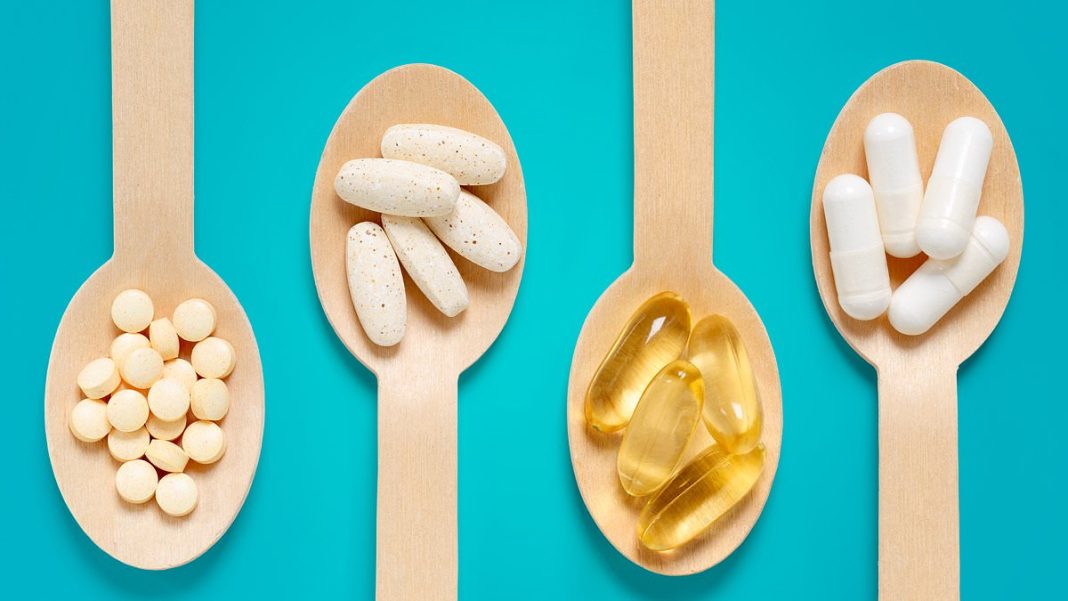Revealed: Popular supplement GP never takes increases risk of death,
Almost half of Brits admit to taking a supplement at least once a month in the pursuit of achieving optimum health.
But one of the UK’s most popular pills could be putting users at an increased risk of deadly liver failure, bone problems and bleeding disorders, an expert has warned.
Taking an ‘all in one’ multivitamin every day may even raise mortality risk, UK-based GP Dr Asif Ahmed said.
It comes as a study by scientists from the National Cancer Institute in Maryland last summer, found that taking a daily multivitamin was associated with a four per cent increased risk of death over the course of the 20-year study.
The researchers found no evidence that the vitamin pills served any benefit for prolonging life.
In an Instagram video seen over 300,000 times, Dr Ahmed said: ‘There is only one supplement that I would never take as a doctor.
‘Lots of people still take it, despite studies showing it can increase your mortality rate—this is any multivitamin supplement.
‘The vast majority of people do not need an all-in-one multivitamin.
‘They [multivitamins] often have more than 100 per cent of the recommended daily allowances for all your vitamins and minerals which can be dangerous.’
The NHS says most people should get all the nutrients they need by having a varied and balanced diet.
The average male adult needs around 700 micrograms (µg) of vitamin A a day, and women 600µg, according to the health service.
But some multivitamins sold on the high street can contain a much higher dose at 800µg per tablet.
Unlike other supplements that are difficult to overdose on, as excess comes out in your urine, multivitamins containing higher levels of vitamin A and vitamin K could also remain in the body as they’re fat soluble.
Dr Ahmed said: ‘For things like vitamin A and vitamin K which are fat soluble it can be quite dangerous and potentially in the long term can lead to liver failure, bone problems, and even bleeding and blood clot disorders.’
Fat soluble vitamins can accumulate in the body over time in the liver and fatty tissue.
If consumed in excess, however, this can weaken the bones, and damage the kidney and the heart.
Taking vitamin D at high doses for an extended period of time can also cause complications like hypercalcemia.
This is where excess calcium is deposited into the bloodstream, increasing the risk of heart and kidney disease.
Dr Ahmed advised people who are worried they are not getting enough essential vitamins and minerals to take one specific supplement for their needs—for example, vitamin D supplements too boost bone health.
Dr Ahmed also said a healthy balanced diet that includes lots of oily fish, fortified foods and fibre is the best way to get all the essential vitamins the body needs.
‘One thing that is fantastic that I take every day is a seed mixture,’ he said.
‘I get the milled version, where they take out the hard shell, to help with digestion and some say it can also increase the nutrient absorption.
‘This is super high in fibre and protein and its got so many minerals and vitamins in it as well. It’s a food not a supplement so this is probably the best way to make sure you get all the trace elements you need in your diet,’ he added.
It comes as the latest official figures show the number of Brits being hospitalised for malnutrition and nutritional deficiencies has almost tripled in a decade.
In 2022, there were more than 800,000 admissions in England and Wales with conditions linked to poor nutrition, including ‘Victorian’ illnesses scurvy and rickets.
Iron deficiency was the biggest problem, NHS data revealed, with admissions for the bone-weakening condition shooting up by 149 per cent since 2013.
Other research has, however, shown that multivitamins may serve no real health benefits.
In 2018, a major study published in the Journal of the American College of Cardiology found that the most popular supplements — multivitamins, vitamin D, calcium, and vitamin C — made no difference to the risk of heart disease, stroke or early death.
Folate — found in leafy greens and eggs — and other B-vitamins were seen to offer some reduced risk of heart disease, although the authors noted that the evidence for this was ‘low to moderate quality’.






